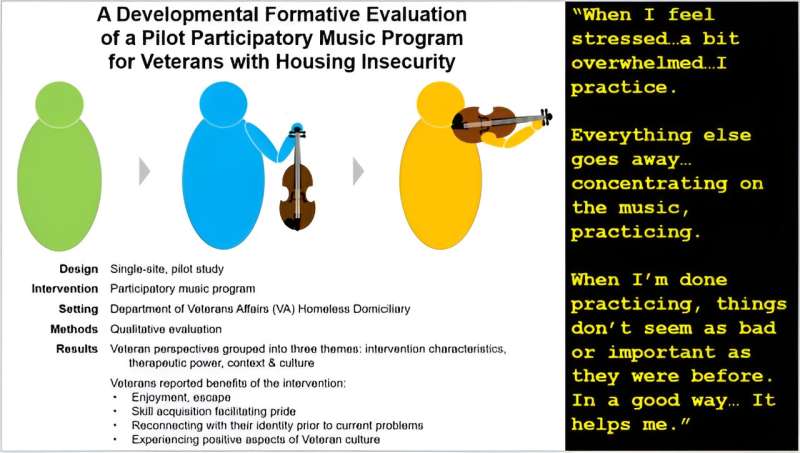This article has been reviewed according to Science X's editorial process and policies. Editors have highlighted the following attributes while ensuring the content's credibility:
fact-checked
trusted source
proofread
Veterans with housing insecurity benefit from making music, finds study

A study by U.S. Department of Veterans Health Administration and Regenstrief Institute research scientists Dawn Bravata, M.D., and Nicholas Rattray, Ph.D., evaluates a participatory music program's effect on veterans struggling with housing insecurity.
The study, "A developmental formative evaluation of a pilot participatory music program for veterans with housing insecurity", is published in BMC Public Health.
The study found a number of benefits including enjoyment, skill acquisition, facilitation of pride, escape from reoccurring issues, reconnection with their identity before current problems and experiencing positive aspects of veteran culture such as mutual support and discipline.
"Several elements of the program contributed to participant well-being," said the study's senior author, Dr. Bravata, who also is an internist at the Richard L. Roudebush VA Medical Center in Indianapolis and a professor at Indiana University School of Medicine.
"The program's teacher expected the participants to learn, and the veterans felt both respect and satisfaction from working to achieve the goals set by the instructor. The veterans described the teacher's fun personality as a key contributor to making each session enjoyable."
The veterans, ages 26 to 59, were provided one-on-one music instruction by the program's teacher in a group setting to help them acquire musical skills.
The purpose of the study was to identify if a participatory intervention, as opposed to a problem-based group reflection, would be helpful for veterans with housing insecurity.
"This program was very different from other programs offered by the Domiciliary Care for Homeless Veterans Program because it was less about self-reflection and more about learning skills," said Dr. Bravata.
"The qualitative responses from the veterans show that a music-based program helps remind them of better times in their lives—and provided them with the hope they could once again enjoy activities in life.
"We interviewed both participants and nonparticipants because we wanted to understand the experiences of those who elected to join the program, but also to understand why some people didn't want to enroll," said Dr. Bravata.
"Some of the non-participant veterans were invited to the group sessions to listen to the music and some of them said they were able to find enjoyment through listening to the music the others were making, even though they were not playing the instruments themselves."
The participant interview responses illuminated the veterans' perspectives and experiences of the participatory music program. Responses produced three salient overarching themes:
- Intervention—the relative advantage of the participatory program over other problem-focused programs; the importance of a supportive, encouraging teacher; the group setting; the role of music.
- Therapeutic power—based on it being enjoyable; and serving as an escape from preoccupations.
- Context/Culture—included veterans supporting each other and the domiciliary setting.
"Veterans who participated in the intervention felt like they could put their problems behind them during the group session. They could concentrate on practicing and shut out anything else that was bothering them," said Dr. Rattray, a co-author.
"For the veterans, practicing between sessions was identified as an immersive experience which distracted them from their worries, and once the practice was over, the issue that had bothered them didn't seem as salient." Dr. Rattray also is on faculty with IU School of Medicine and Indiana University Purdue University Indianapolis.
The participating veterans used string instruments such as the violin, viola and cello. During the program sessions, the veterans and their teacher played different genres of music.
The Domiciliary Care Program is the VA's oldest health care program. Domiciliary care was initially established to provide services to economically disadvantaged veterans, and it remains committed to serving that group. The domiciliary programs are integrated with the Mental Health Residential Rehabilitation and Treatment Programs.
More information: Sally Wasmuth et al, A developmental formative evaluation of a pilot participatory music program for veterans with housing insecurity, BMC Public Health (2023). DOI: 10.1186/s12889-023-16427-8


















